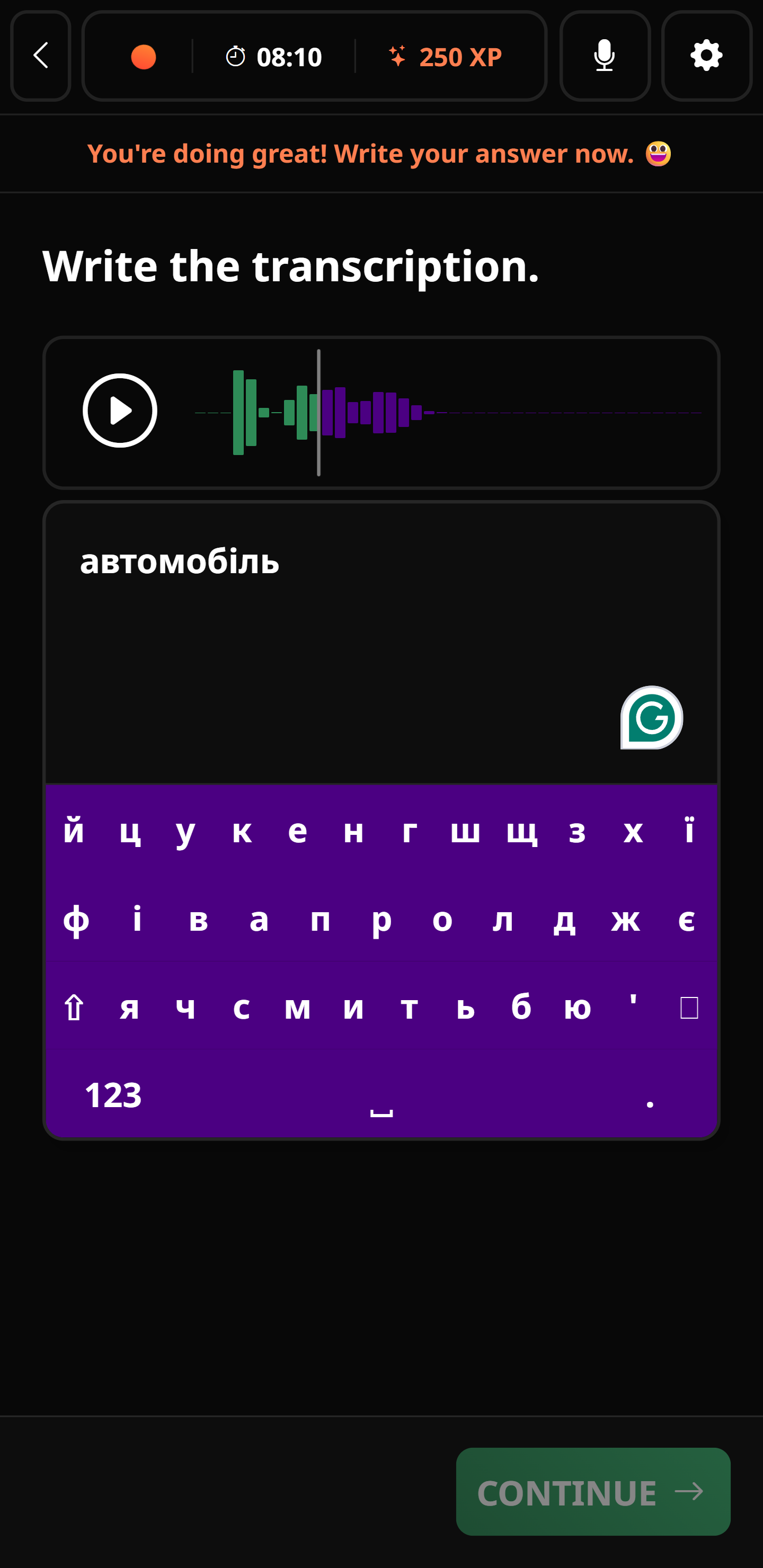Understanding Advanced Ukrainian Verbs
For advanced Ukrainian language learners, mastering complex verbs is essential for achieving fluency. The 20 verbs in Ukrainian that we'll explore in this post go beyond the 100 Essential Ukrainian Words Every Beginner Should Know and require a deeper understanding of Ukrainian Cases and grammatical nuances. Ukrainian verbs are particularly rich in meaning and can change significantly with the addition of prefixes, altering not just their meaning but also their aspect. Advanced learners need to understand these subtle distinctions to communicate effectively in professional, academic, and social contexts.
Important
Ukrainian verbs have two aspects: perfective (completed action) and imperfective (ongoing or habitual action). Most verbs exist in pairs, with each aspect having its own conjugation patterns. Advanced learners must master both forms to express themselves precisely.
Verb Aspect in Ukrainian
The aspect system is fundamental to Ukrainian verbs and distinguishes between completed actions (perfective) and ongoing or habitual actions (imperfective). Unlike English, where tense primarily indicates when an action occurs, Ukrainian uses both tense and aspect to convey the complete meaning. Advanced learners must understand that perfective verbs typically have prefixes that modify the base imperfective form, creating nuanced meanings that can be challenging to translate directly into English. Mastering these aspectual pairs is crucial for sophisticated Ukrainian communication.
Notes
When learning advanced Ukrainian verbs, always memorize both aspects together as a pair. This approach will help you develop an intuitive feel for when to use each aspect in conversation.
Become bilingual in 30 days with Univext!
Start a lesson with our teacher for free and become bilingual like our 50,000 students!



Verb Prefixes and Their Impact on Meaning
Ukrainian verb prefixes dramatically alter meaning, creating an extensive vocabulary from a single root verb. Advanced learners must recognize how prefixes like "в-", "ви-", "за-", "на-", "пере-", and others transform verbs. These prefixes don't just change the aspect but can completely shift the semantic meaning. For instance, the root verb "ходити" (to walk) can become "виходити" (to exit), "заходити" (to enter), "переходити" (to cross over), and many more variations. This system allows Ukrainian to express precise actions with remarkable economy.
Examples
Base verb (to walk) can transform into: - (to exit) - (to enter) - (to cross over) - (to move away) - (to arrive)
Essential Verb: Бути (To Be)
The verb (to be) is fundamental in Ukrainian, though it functions differently than in English. In present tense, it's often omitted, while in past and future tenses, it's fully conjugated. Advanced learners should master its irregular forms and understand its role in forming compound tenses. This verb is essential for constructing complex sentences and expressing abstract concepts in academic and professional Ukrainian.
Notes
While the present tense forms of exist, they're rarely used in everyday speech. Instead, Ukrainians typically omit the verb entirely: (I am a student).
Essential Verb: Мати (To Have)
(to have) is a critical verb for advanced Ukrainian learners, functioning differently from possession verbs in many other languages. Unlike English "to have," Ukrainian is used more selectively, with alternative constructions often preferred for expressing possession. Advanced learners must master both this verb and the alternative "у мене є" construction to sound natural. The verb is also used in numerous idiomatic expressions that have no direct English equivalents.
Examples
Alternative possession construction: (I have a book, literally "By me is a book")
Become bilingual in 30 days with Univext!
Start a lesson with our teacher for free and become bilingual like our 50,000 students!



Essential Verb: Могти (Can/To Be Able)
The modal verb expresses ability, possibility, or permission in Ukrainian. Advanced learners need to master its irregular conjugation patterns and understand the subtle differences between and (to know how to). This verb is essential for expressing nuanced ideas about capability and possibility in professional and academic contexts, and it combines with infinitives to create complex verbal constructions.
Important
Unlike English, Ukrainian distinguishes between general ability () and learned skills (). Compare: - (I can lift this suitcase - physical ability) - (I can play the piano - learned skill)
Essential Verb: Знати (To Know)
(to know) is a fundamental verb that advanced Ukrainian learners must master for expressing knowledge of facts, information, or acquaintance with people. Unlike English, Ukrainian distinguishes between knowing facts () and knowing how to do something (). This distinction allows for more precise expression in academic and professional contexts. The verb follows regular conjugation patterns but appears in numerous idiomatic expressions.
Examples
(I know that it will rain tomorrow) (I know this person)
Essential Verb: Розуміти (To Understand)
(to understand) is crucial for advanced Ukrainian learners who need to express comprehension of complex ideas, conversations, or texts. This verb follows regular conjugation patterns but has important prefixed variations that change its meaning subtly. Advanced learners should master not just the basic verb but also its derivatives like (perfective) and idiomatic expressions that use this verb to express deeper levels of understanding beyond literal comprehension.
Notes
The perfective form emphasizes the moment of comprehension, while the imperfective refers to ongoing understanding. Compare: - (I don't understand this concept - general state) - (I understood what happened - moment of realization)
Become bilingual in 30 days with Univext!
Start a lesson with our teacher for free and become bilingual like our 50,000 students!



Essential Verb: Говорити/Сказати (To Speak/To Say)
The verb pair (imperfective) and (perfective) is essential for advanced Ukrainian communication. These verbs are used differently than their English counterparts, with referring to the process of speaking and emphasizing the completed act of saying something specific. Advanced learners must master both forms and their numerous prefixed derivatives that express nuanced meanings about communication.
Important
Ukrainian has several verbs related to speaking, each with specific contexts: - - to speak (general) - - to converse - - to say/tell - - to tell (a story)
Essential Verb: Робити/Зробити (To Do/To Make)
(imperfective) and (perfective) are versatile verbs that advanced Ukrainian learners must master. These verbs are used in countless contexts to express doing, making, performing, or creating. They form the base for numerous prefixed derivatives that express specific types of actions. Understanding the distinction between the ongoing process () and the completed action () is crucial for precise communication in professional and academic settings.
Examples
(I do homework every day - habitual) (I made an important discovery - completed)
Essential Verb: Йти/Піти (To Go on Foot)
The motion verbs (imperfective) and (perfective) specifically refer to going on foot, unlike the English "to go" which is more general. Advanced Ukrainian learners must understand the distinction between these verbs and other motion verbs like (to go by vehicle). These verbs form the base for numerous prefixed forms that express direction, making them essential for precise spatial descriptions. Their conjugation patterns are irregular and must be memorized.
Important
Ukrainian distinguishes between unidirectional motion (going in one direction) and multidirectional motion (going in multiple directions or habitually). Compare: - (I am going to school right now - unidirectional) - (I go to school every day - multidirectional/habitual)
Become bilingual in 30 days with Univext!
Start a lesson with our teacher for free and become bilingual like our 50,000 students!



Essential Verb: Їхати/Поїхати (To Go by Vehicle)
(imperfective) and (perfective) specifically refer to traveling by vehicle, distinguishing Ukrainian motion verbs from the more general English "to go." Advanced learners must master these verbs and their numerous prefixed forms that indicate direction. Like other motion verbs, they distinguish between unidirectional and multidirectional movement, adding another layer of complexity. These verbs are essential for discussing travel, commuting, and transportation in sophisticated Ukrainian.
Notes
The multidirectional form of is , used for habitual or repeated travel: (I go to work by bus - habitual)
Essential Verb: Давати/Дати (To Give)
(imperfective) and (perfective) are fundamental verbs for expressing the act of giving. Advanced Ukrainian learners must master their irregular conjugation patterns and understand how they interact with the dative case for indirect objects. These verbs appear in numerous idiomatic expressions and form the base for prefixed derivatives with specialized meanings. The distinction between the process of giving () and the completed act () is crucial for precise communication.
Examples
(I am giving you my book - process) (I will give you an answer tomorrow - completed future action)
Essential Verb: Брати/Взяти (To Take)
The verb pair (imperfective) and (perfective) expresses the action of taking or picking up. Advanced Ukrainian learners must master their irregular conjugation patterns and understand their numerous prefixed derivatives that express specialized meanings. These verbs are used in many idiomatic expressions and are essential for discussing acquisition, borrowing, and physical handling of objects. The distinction between the process () and the completed action () is crucial for precise communication.
Important
These verbs often combine with prefixes to create new meanings: - - to take away - - to take away forcefully - - to sort through, to take too much - - to choose, select
Become bilingual in 30 days with Univext!
Start a lesson with our teacher for free and become bilingual like our 50,000 students!



Essential Verb: Бачити/Побачити (To See)
(imperfective) and (perfective) express visual perception in Ukrainian. Advanced learners must understand the distinction between the state of seeing () and the moment of noticing or spotting something (). These verbs are used in numerous idiomatic expressions related to understanding, meeting people, and experiencing events. Their conjugation follows regular patterns but requires attention to consonant alternations in some forms.
Examples
(I see the problem - ongoing state) (I noticed something interesting - moment of seeing)
Essential Verb: Чути/Почути (To Hear)
The verb pair (imperfective) and (perfective) expresses auditory perception. Advanced Ukrainian learners must understand the distinction between the ongoing state of hearing () and the moment of hearing something specific (). These verbs are used in numerous expressions related to information reception, rumors, and understanding. Their conjugation follows regular patterns but requires attention to consonant alternations in some forms.
Notes
can also mean "to hear about" something, similar to the English expression: (I've heard about this book)
Essential Verb: Думати/Подумати (To Think)
(imperfective) and (perfective) express the process of thinking and contemplation. Advanced Ukrainian learners must master these verbs for discussing opinions, beliefs, and cognitive processes. The imperfective form refers to ongoing thought processes, while the perfective indicates a completed thought or moment of consideration. These verbs form the base for numerous derivatives expressing different types of thinking and appear in many idiomatic expressions related to mental activities.
Important
These verbs combine with prefixes to create specialized meanings: - - to become lost in thought - - to think through thoroughly - - to change one's mind - - to invent, come up with
Become bilingual in 30 days with Univext!
Start a lesson with our teacher for free and become bilingual like our 50,000 students!



Essential Verb: Хотіти (To Want)
is an essential verb for expressing desires, wishes, and intentions in Ukrainian. Advanced learners must master its irregular conjugation pattern and understand how it combines with infinitives to express complex wants. Unlike many Ukrainian verbs, doesn't have a standard perfective counterpart, though can be used to express the onset of wanting. This verb is crucial for polite requests, expressing preferences, and discussing motivations in sophisticated Ukrainian.
Examples
(I want to learn Ukrainian perfectly) (They want us to come earlier)
Essential Verb: Любити/Полюбити (To Love, To Like)
(imperfective) and (perfective) express both love and strong liking in Ukrainian. Advanced learners must understand that this verb covers a broader semantic range than English "to love," extending to preferences and habitual enjoyment. The imperfective form expresses ongoing affection or habitual enjoyment, while the perfective indicates the beginning of love or liking. These verbs are essential for discussing relationships, preferences, and interests in sophisticated Ukrainian.
Notes
Unlike English, Ukrainian uses for both romantic love and general preferences: - (I love my wife) - (I like coffee)
Essential Verb: Жити (To Live)
is a fundamental verb for discussing existence, residence, and lifestyle in Ukrainian. Advanced learners must master its conjugation pattern and understand its numerous prefixed forms that express different aspects of living. While primarily imperfective, it pairs with as its perfective counterpart for discussing completed periods of life. This verb is essential for biographical information, discussing housing, and philosophical conversations about existence in sophisticated Ukrainian.
Important
combines with prefixes to create specialized meanings: - - to live through (a period) - - to survive - - to outlive, to survive through - - to begin living (in a certain way)
Become bilingual in 30 days with Univext!
Start a lesson with our teacher for free and become bilingual like our 50,000 students!



Essential Verb: Працювати (To Work)
is primarily imperfective and expresses the process of working or being employed. Advanced Ukrainian learners must master its conjugation pattern and understand its prefixed forms that express different aspects ofwork. This verb is crucial for professional contexts, discussing employment, and describing effort or labor. Though primarily imperfective, it pairs with as its perfective counterpart for discussing limited periods of work. Advanced learners must understand how this verb functions in various professional and academic contexts.
Examples
(I work at a university) (She is working on an important project)
Essential Verb: Вчитися/Навчитися (To Learn, To Study)
(imperfective) and (perfective) are reflexive verbs expressing the process of learning or studying. Advanced learners must master their conjugation patterns, which follow reflexive verb rules with the "-ся" ending. The imperfective form describes the ongoing process of education or skill acquisition, while the perfective indicates successful mastery. These verbs are essential for academic contexts, discussing educational experiences, and expressing skill development in sophisticated Ukrainian.
Notes
Related verbs include (to teach, to learn something) and (to teach), which are not reflexive: - (I study at a university) - (I am learning the Ukrainian language) - (The professor teaches students)
Essential Verb: Стати/Ставати (To Become)
(perfective) and (imperfective) express transformation or becoming in Ukrainian. Advanced learners must understand that is the perfective form, while is derived from it as the imperfective aspect—a reversal of the usual pattern. These verbs are essential for discussing career development, personal transformation, and changes of state. They combine with nouns in the instrumental case to express what someone becomes.
Important
These verbs require the instrumental case for the complement: (He became a famous writer) (She is becoming more experienced every day)
Become bilingual in 30 days with Univext!
Start a lesson with our teacher for free and become bilingual like our 50,000 students!



Mastering Complex Ukrainian Verb Constructions
Advanced Ukrainian proficiency requires not just knowledge of individual verbs but understanding how they function in complex constructions. Ukrainian uses verb combinations to express nuanced meanings that may require entirely different structures in English. These include:
- Modal constructions with , , , and
- Phase verbs like (to begin), (to continue), (to finish)
- Reflexive verbs that indicate actions directed at oneself or actions happening spontaneously
- Compound future tense formed with and the infinitive
Examples
Modal construction: (I need to learn these verbs) Phase verb: (She began working at eight) Reflexive: (The doors opened by themselves) Compound future: (I will be reading this book tomorrow)
Verb Governance and Prepositions
A particularly challenging aspect of advanced Ukrainian verb usage is understanding which prepositions and cases each verb requires. Unlike English, where prepositions often seem interchangeable, Ukrainian verbs consistently govern specific prepositions and cases. Advanced learners must memorize these patterns to communicate accurately. For example, (to think about) requires the accusative case, while (to think over) requires the instrumental.
Important
Common verb governance patterns to master: - (to wait for) - (to thank) - (to forgive) - (to be interested in) - (to be fascinated by)
Cultural Context and Idiomatic Expressions
Advanced Ukrainian proficiency involves understanding how verbs function in cultural contexts and idiomatic expressions. Many Ukrainian expressions use verbs in ways that don't translate literally into English. Mastering these expressions will make your Ukrainian sound more natural and culturally informed. Be aware that verb aspect often plays a crucial role in idiomatic expressions, with the choice between perfective and imperfective subtly altering the meaning.
Examples
Common idiomatic expressions: - (to take into account) - (to manage, cope) - (to mean, to have in mind) - (to lose one's temper) - (to come to one's senses)
Become bilingual in 30 days with Univext!
Start a lesson with our teacher for free and become bilingual like our 50,000 students!



Conclusion
Mastering these 20 essential Ukrainian verbs will significantly enhance your ability to communicate fluently and precisely in Ukrainian. Remember that verb aspect, prefixes, and proper case governance are crucial for accurate expression. By understanding the nuances of these verbs and practicing their various forms in context, you'll develop a more sophisticated command of Ukrainian suitable for professional, academic, and social situations.
Continue expanding your Ukrainian vocabulary with resources like our guides to Essential Ukrainian Phrases and Ukrainian Cases. Regular practice with native speakers will help you internalize these complex verb patterns and use them naturally in conversation.
Notes
For effective practice, try creating sentences using each verb in both aspects (where applicable) and with different prefixes. Pay attention to how native speakers use these verbs in context, noting which prepositions and cases they require.
